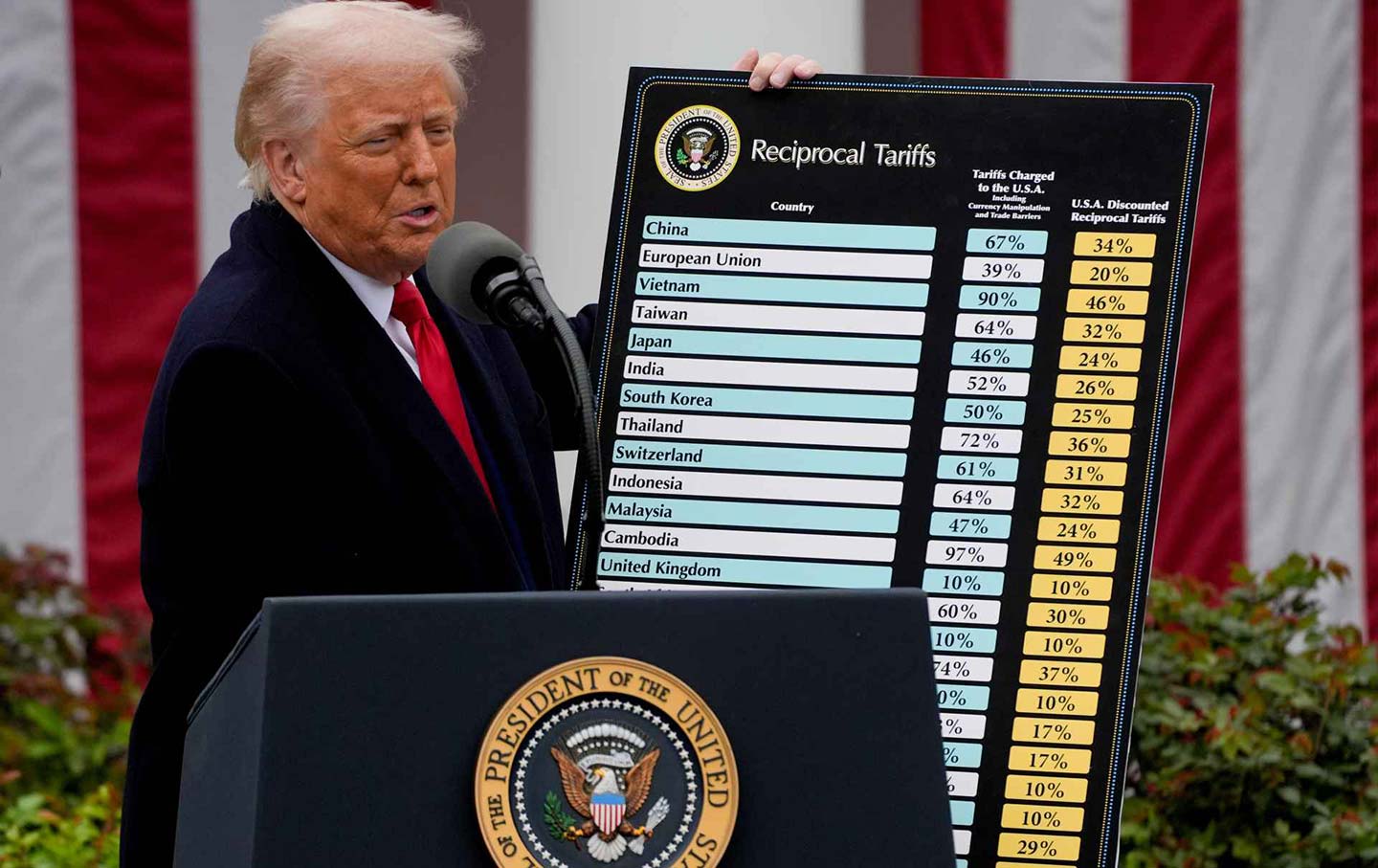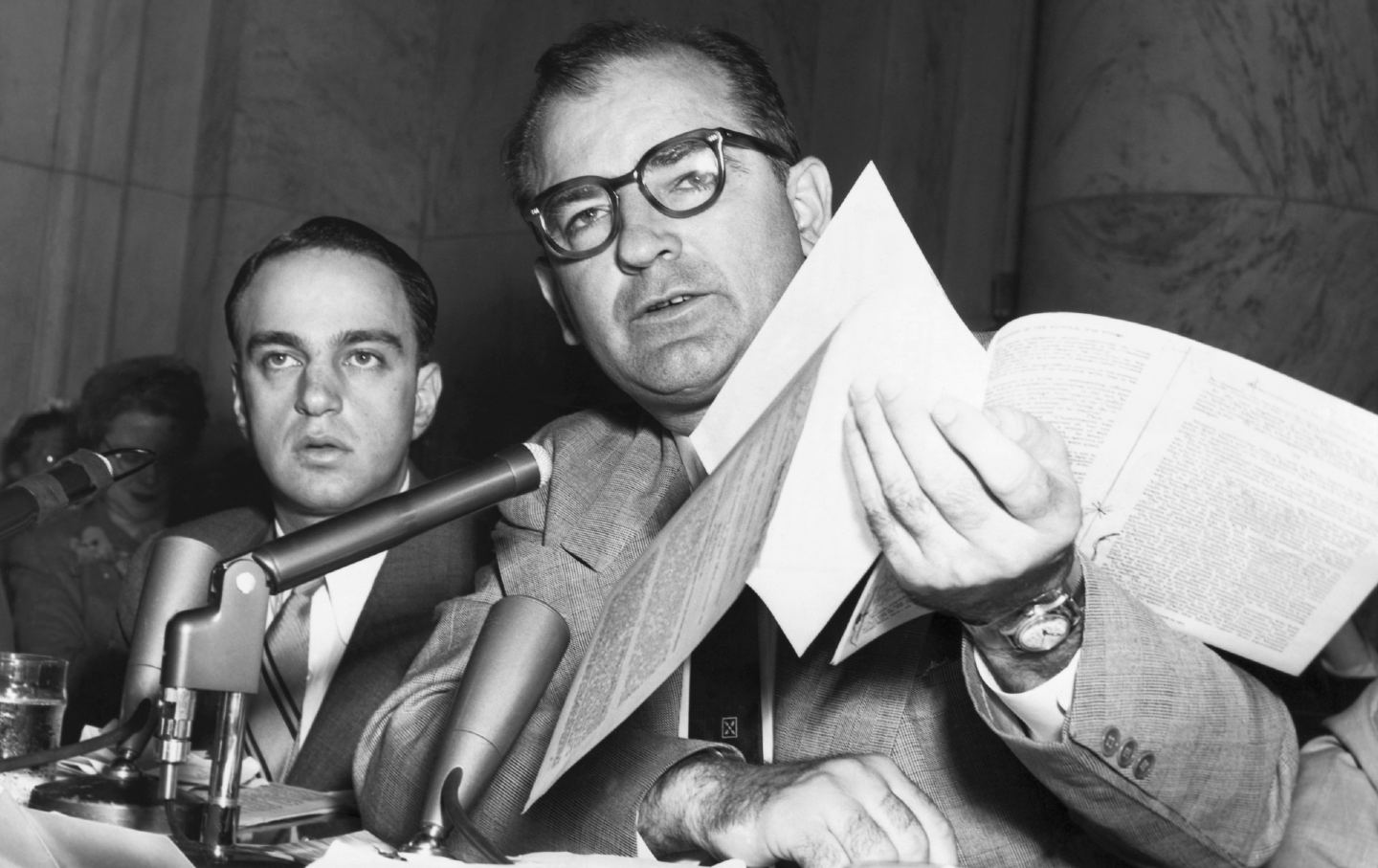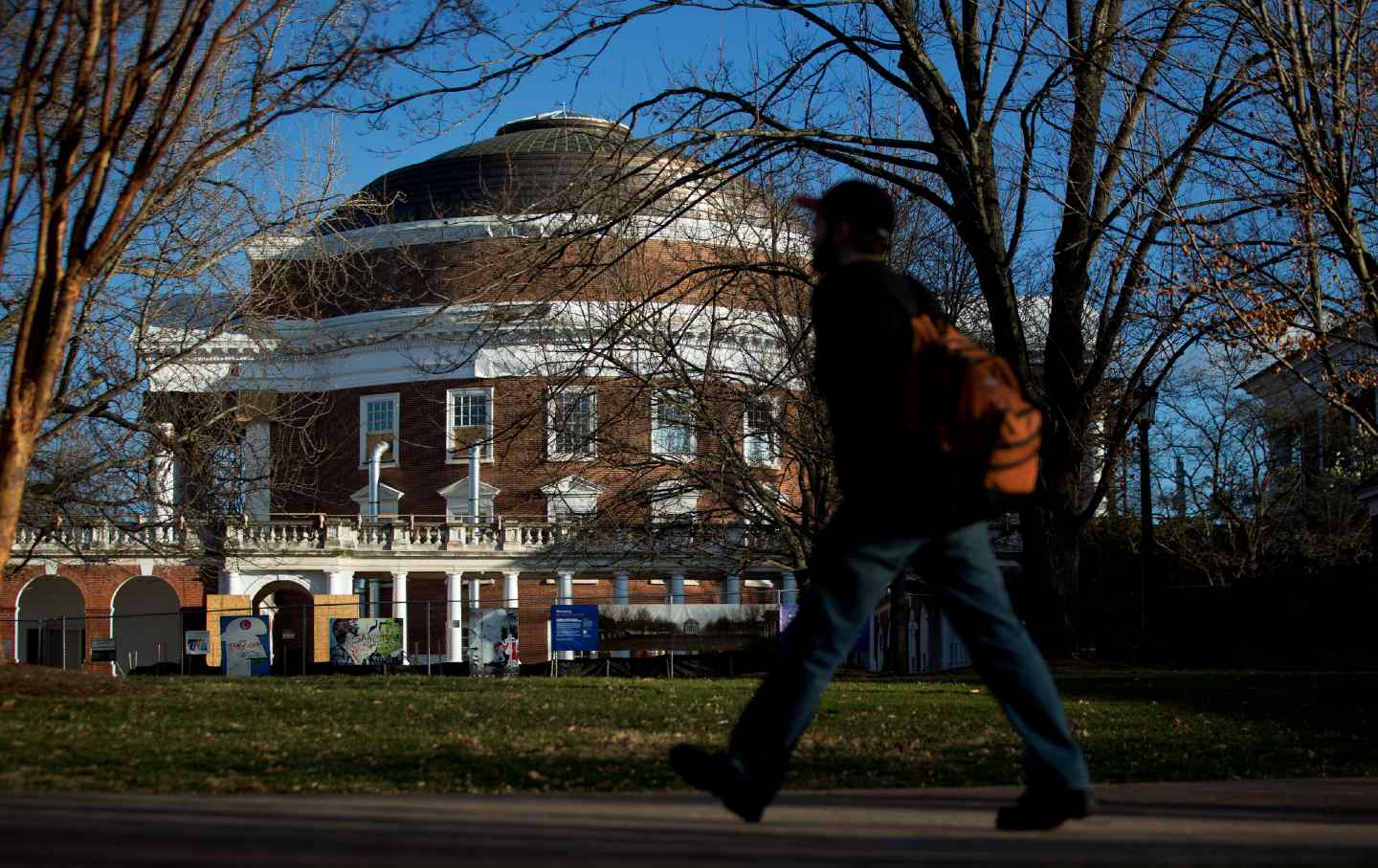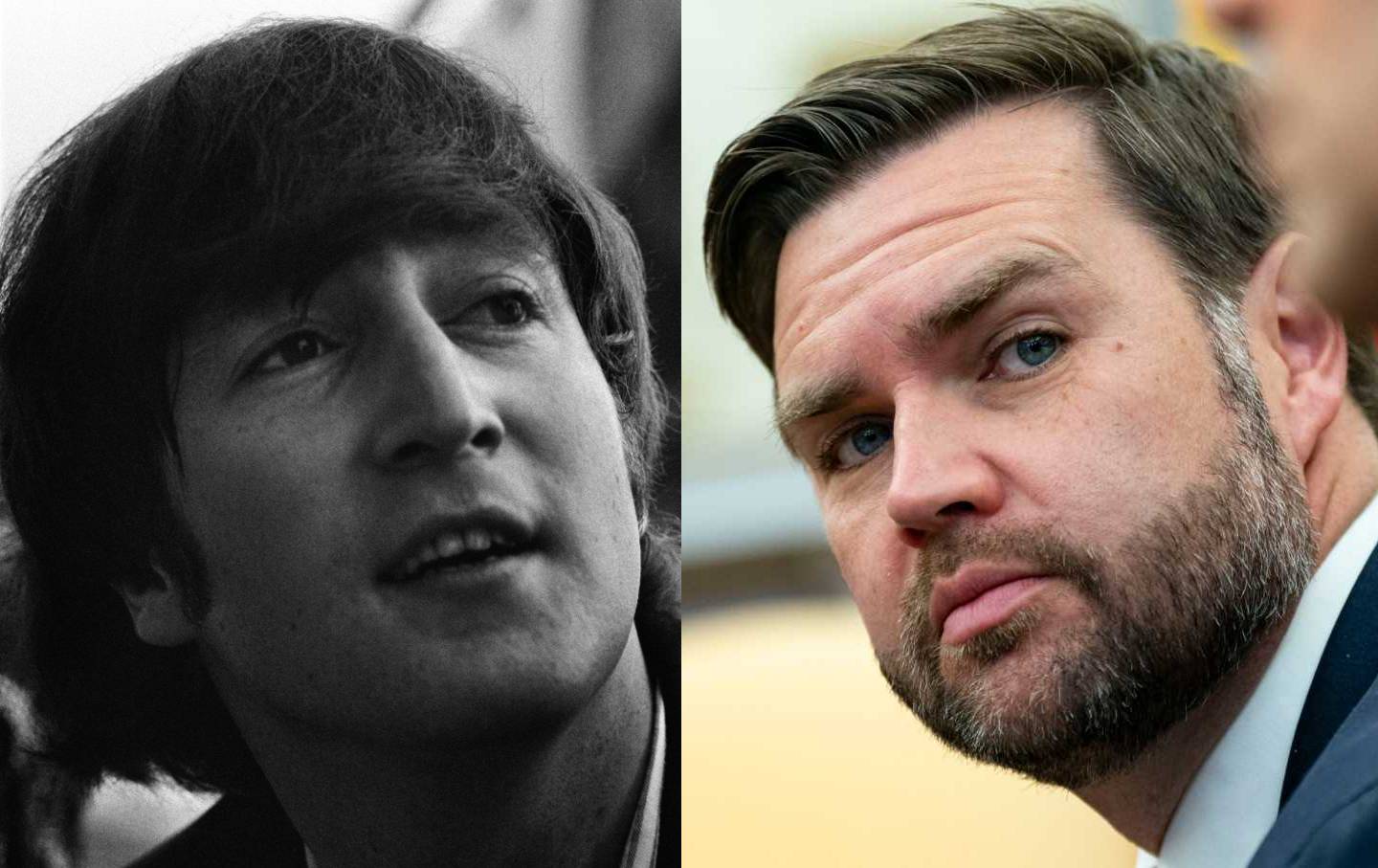After a Shaky Start, Walz Reveals the Fascist Behind the Curtain
In the vice-presidential debate, JD Vance was every bit the polished Yale Law alum, but his canned bromides turned foul in the end.
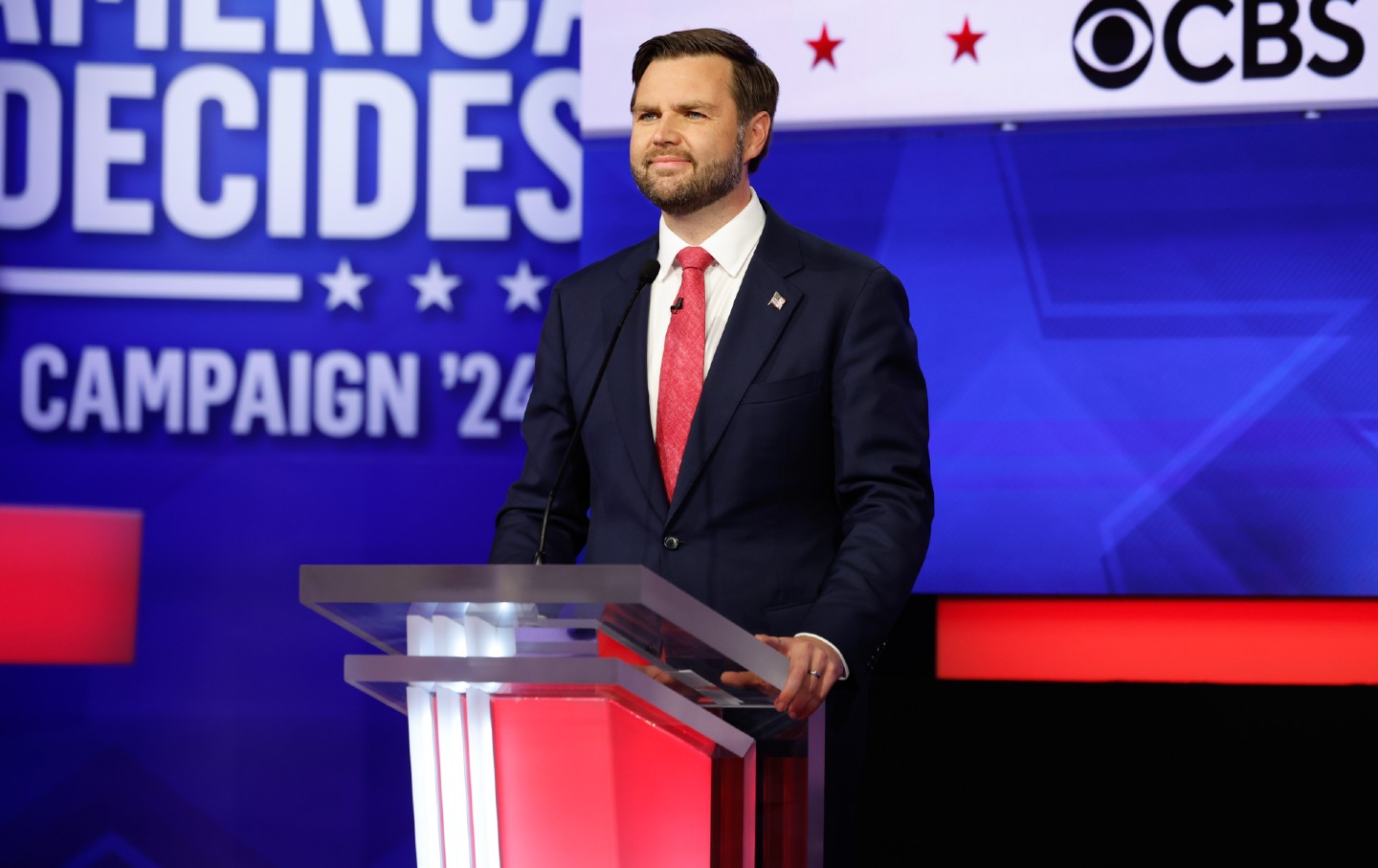
Republican vice-presidential candidate Senator JD Vance participates in a debate at the CBS Broadcast Center on October 1, 2024, in New York City.
(Chip Somodevilla / Getty Images)
Out on the hustings, Minnesota Governor Tim Walz likes to make sport of JD Vance’s reputation-making memoir Hillbilly Elegy by noting that in the American classrooms in which he taught, kids didn’t typically launch themselves as Big Tech venture capitalists with a Yale Law degree. Right-wing pundits have derided the line, because it sounds like a confession of meritocratic failure; after all, why would any teacher boast about bypassing Ivied achievement and all the blessings it confers?
Tuesday’s vice presidential debate didn’t produce much in the way of big rhetorical moments or exchanges likely to alter the dynamics of the 2024 presidential election, but it did furnish a clear instance of just what Walz has been talking about. Vance, as the running mate of the man he formerly excoriated as an authoritarian menace and a populist failure, was every bit the polished Yale Law alum, delivering canned bromides about the imperiled American Dream, liberal assaults on free speech, and the destructive social and economic ills wrought by immigrants.
And unlike his running mate, Vance didn’t get rattled by his rival’s counter-parries; instead, his often contradictory and off-topic claims came off as the just-asking-questions shtick of a podcast bro. Through it all, CBS News moderators Norah O’Donnell and Margaret Brennan mostly sat by as they rushed through their list of questions and prompts.
Vance’s MO was evident at the outset, as O’Donnell asked both candidates about the escalation of hostilities in the Middle East, and whether Israel would be justified in using preemptive force to prevent Iran from pursuing nuclear weapons. Vance nonsensically claimed that Donald Trump “did establish stability in the world,” because he “recognized that for people to fear the United States, you need peace through strength”—even though the Trump-brokered Abraham Accords, which the Biden administration has foolishly extended, have exacerbated the regional crisis. And in that same incoherent spirit, Vance, who has an unearned image as a critic of interventionism, blandly signed off on the question’s nightmare scenario, proclaiming, “It is up to Israel what they think they need to do to keep the country safe.”
This same strained effort to peddle derangement as higher competence guided all of Vance’s replies, perhaps most especially when their content was plainly unhinged; the cumulative effect was like seeing a Quillette comments page dressed up as a college commencement address. The next question, on the catastrophic impact of Hurricane Helene and the role of global warming in producing extreme weather events, yielded a reply from Vance about repatriating manufacturing energy production and manufacturing, since America’s economy is cleaner than heavier-polluting regimes like China. Never mind that Vance proceeded to disparage the US regulatory state for the balance of the debate—and that the Republican-led federal judiciary is undermining the legal basis for most environmental regulation; Vance had his college-debating point in hand, and tried to drive it home with this flourish: “If the Democrats are serious about this issue, they’d support more manufacturing and energy production in the United States. Clearly, Kamala Harris does not believe her own rhetoric on this or she’d support Donald Trump’s program.”
To his credit, Walz, who got off to a shaky start, tried to puncture Vance’s claims, citing the 250,000 manufacturing jobs created under the carbon-mitigation provisions of the Inflation Reduction Act and noting that Trump not only dismissed climate change as a hoax but had summoned oil company executives to a Mar-a-Lago fundraiser where he said, “Give me your money and I’ll do whatever you want.” But thanks to a format that abjured real-time fact-checking from the moderators, Vance was able to do in his logic-chopping lawyerly appeals what Trump and his allies have done throughout the broader mediasphere: flood the zone with shit.
Vance’s routine wore thinnest when he dismissed the projections of Trump’s proposed upper-tier tax cuts and regressive tariffs as reckless and probably recessionary. He laid into the same credentialed expert caste that he belongs to; the economists who cavil at Trump’s economic program “have PhDs, but they don’t have common sense and they don’t have wisdom,” Vance declared, while hymning Trump’s “courage and wisdom” in defying them.
Yet, out of the other side of his mouth, Vance cast Harris as an asleep-at-the-wheel omni-competent expert who refused to exert her powers on the people’s behalf. Over and over again, he marveled that she’d been vice president for three-and-a-half years and didn’t produce major policy breakthroughs, on what can only be described as a delusional appraisal of the powers of the American vice presidency. At one point, Vance claimed that Harris had let 25 million immigrants—itself a baseless, inflated number—into the country; at another, that she’d unleashed 60 percent hikes in food prices and 25 percent increases in rent. At still another point, he claimed that the regulatory minions of the administrative state “want to throw people in jail for not doing everything that Kamala Harris says they have to do.”
Somewhere the spirit of FDR’s former vice president, John Nance Garner, who described his office as “not worth a bucket of warm piss,” was chuckling mirthlessly. Yet the larger question hovering over Vance’s fusillades—“Are experts toothless critics on the sidelines or malevolent social engineers?”—never got engaged, because doing so would force Vance to reconcile the contradictions in his own slapdash messaging. Vance’s identity as a son of Applachia was the magic that granted him entry into the overlapping worlds of Peter Thiel’s tech empyrean, the elite political commentariat, and the great rolling MAGA grift. If the mask is allowed to slip, he’s just another Benny Johnson or Tim Pool.
Walz found his footing in the debate’s latter half, demolishing Vance’s disingenuous claim that the Republican Party needs to do more to “win the trust” of voters on reproductive rights with arresting accounts of women who’ve been denied critical care and in some cases died due to the uncertainty, or illegality, of abortion access in their home states. “How can we as a nation say that your life and your rights, and something as basic as the right to control your own body, depends on geography?” On healthcare, Walz also showed a command of the policy implications of Vance’s hollow posturing on the issue; he called out Vance’s embrace of a states-driven license to experiment with coverage limits as something worse than Trump’s maligned “concepts of a plan” line from his debate with Harris. “It’s pre-Obamacare,” he explained. “You’re just going to let insurance companies pick who they’re going to insure.”
By the final debate question, about January 6, and whether the Trump-Vance ticket would honor the results of this election if it lost, Vance was reduced to his emptiest shibboleths: He was “focused on the future,” he claimed, even though the moderators’ question was about a scenario of future election denial. He then tried, ludicrously, to claim that the true and urgent threat to democracy was the censorship forced upon social media platforms like Facebook by a deep-state power elite. This, Vance solemnly intoned, was “a much bigger threat to democracy than anything that we’ve seen in this country over the past four years or the past 40 years.” And Harris, roused now to wield her superhero powers for evil, has “engaged in censorship on an industrial scale.” Walz countered with one of the evening’s best lines: “January 6 was not Facebook ads,” and then asked Vance directly whether he thought Trump lost the 2020 election. When Vance once more robotically intoned, “I’m speaking about the future,” Walz shot back, “That’s a damning nonanswer.” It had taken a long time, but the Yale Law overachiever was finally well and truly schooled.

